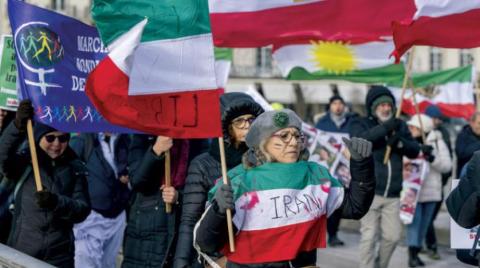
Britain and the EU appear on the brink of a trade war after Brussels accused Boris Johnson of lacking sincerity in negotiations over Northern Ireland’s future and warned of “serious consequences” if Downing Street suspended the post-Brexit deal.
As he emerged from his latest tense meeting with the UK’s Brexit minister, the EU commissioner Maroš Šefčovič said that despite Brussels’ attempts to find a compromise, “we have seen no move at all from the UK side”.
The two sides have been locked in talks for three weeks over changes to how the Brexit deal works to ensure the free flow of trade between Britain and Northern Ireland. The EU has offered to cut customs controls in half and health checks on animal and plant products heading to supermarkets by 80%, but Šefčovič suggested there had been scant effort by David Frost, the Brexit minister, to engage with the proposals.
“I found this disappointing and once again I urge the UK government to engage with us sincerely,” Šefčovič said. “From this perspective, I see next week as an important one. We should focus all efforts on reaching a solution as soon as possible.
“Our aim should be to establish stability and predictability for Northern Ireland. We hear a lot about article 16 at the moment, but there’ll be no doubt that triggering article 16 to seek the negotiation of the protocol would have serious consequences.
“Serious for Northern Ireland, as it would lead to instability and unpredictability, and serious also for the EU-UK relations in general, as it would mean a rejection of EU efforts to find a consensual solution to the implementation of the protocol.”
Under the protocol, Northern Ireland in effect remains in the single market for goods while the EU’s customs rulebook is enforced on goods entering from Britain. Brussels has conceded that the implementation of these arrangements has created political disruption in Northern Ireland.
Lord Frost reiterated on Friday, however, that the remedies proposed did not go far enough. The UK government wants to maintain a free flow of trade between Northern Ireland and the wider single market including the Republic but without a role for the European court of justice as arbiter of whether EU law is being followed.
“Lord Frost set out the UK’s assessment of the negotiations on the protocol,” a UK government spokesperson said of the meeting with Šefčovič. “He underlined that progress had been limited and that the EU’s proposals did not currently deal effectively with the fundamental difficulties in the way the protocol was operating.”
Article 16 of the protocol allows either side to take unilateral “safeguard measures” that would suspend parts of the deal agreed by Johnson with Brussels if it causes “serious economic, societal or environmental difficulties”.
Such a move would be seen as incendiary in EU capitals, which have been infuriated by Downing Street’s refusal to implement a deal agreed in October 2019. Before his meeting in Brussels, Frost nevertheless warned triggering article 16 was “very much on the table”, adding that time was running out.
“We hope to make some progress, but honestly, the gap between us is still quite significant, but let’s see where we can get to,” he said. “We’re not going to trigger article 16 today, but article 16 is very much on the table and has been since July.
“Time is running out on these talks if we are to make progress.”
Frost had set the EU a three-week deadline after the 12 October publication in Brussels of a plan to drastically reduce the level of checks on trade going from Great Britain into Northern Ireland.
It is widely expected that any decision on article 16 will be made after the Cop26 climate talks in Glasgow, which are due to end on 12 November.
Frost said: “I’m not going to give any timescales or any hypotheticals. There’s a significant gap between us. If that gap narrows and the commission listens to what we have said in the command paper and looks at the situation in Northern Ireland, then maybe that will help us move things forward.”
There has been speculation the UK could use article 16 to implement its vision for Northern Ireland, as outlined in a July command paper. However, the treaty only allows for “strictly necessary” actions “to remedy the situation”. There is ongoing debate in government at what this legally permits.
Should the UK trigger article 16, there will be a range of options available to the EU, including giving notice of terminating the trade and cooperation agreement that ensures tariff-free trade.
EU sources said it was unlikely Brussels would jump to such a decision given the range of other options within the treaty to respond to the UK, including targeted tariffs on British exports.












